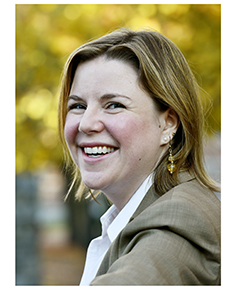
(Above: Photography by Alexandr Bricky; below: Photo courtesy Courtney C. W. Guerra)
In her new book, Courtney C. W. Guerra, AB’05, offers witty work advice.
 For two years Courtney C. W. Guerra, AB’05, juggled a secret identity. By day Guerra worked as the senior writer for grants and fellowships in the Division of the Humanities at UChicago. By night she was the witty, anonymous voice of the Dear Businesslady workplace advice column for the now-defunct website the Toast. (Guerra now answers questions on the financial advice website the Billfold.) Guerra blew her own cover with Is This Working? The Businesslady’s Guide to Getting What You Want from Your Career (Adams Media, 2017), a book drawing on the “Dear Businesslady” column but published under her real name.
For two years Courtney C. W. Guerra, AB’05, juggled a secret identity. By day Guerra worked as the senior writer for grants and fellowships in the Division of the Humanities at UChicago. By night she was the witty, anonymous voice of the Dear Businesslady workplace advice column for the now-defunct website the Toast. (Guerra now answers questions on the financial advice website the Billfold.) Guerra blew her own cover with Is This Working? The Businesslady’s Guide to Getting What You Want from Your Career (Adams Media, 2017), a book drawing on the “Dear Businesslady” column but published under her real name.
The book offers practical tips on landing a job (“For the love of any and all higher powers, do NOT try to participate in a phone interview while doing anything else”) and guidance on navigating thorny interpersonal issues at work (“You can fantasize about delivering a scathing monologue to your boss and then storming out as the office explodes behind you, but you can’t actually do that, … at least not in the real world, where people live”).
For Is This Working?, Guerra pulled from her own winding career path. Throughout college she told people she planned to become a teacher, “mainly because that was a really good way of shutting people down when they [asked], ‘Why are you majoring in English?’” After graduation she worked as an executive assistant, then transitioned to grant writing, a job she hadn’t known about in school. Guerra spoke to the Magazine about how her Businesslady alter ego has changed her approach to her own work, when to keep a less-than-perfect job, and why writing an advice column is like editing. Her comments have been condensed and edited.
Why “businesslady”?
Back when it was a column, I wanted it to be anonymous, partly because there’s a long tradition of anonymous advice columns. And “businesslady” is a word I’ve always found funny. My mom thinks it’s hilarious, which I love. I wanted to signal that I was a woman since the Toast had a very strong female perspective. I wanted to let people have a little sliver of who I was as a person. I don't work in a corporate business, so there’s a way in which it’s a bit of a misnomer, but it gets the point across.
Did writing the Businesslady column make you approach your own work differently?
I have always tried to approach my work in a way that’s kind to my colleagues and responsible. But there was certainly an added pressure. If I totally screwed something up or started behaving unprofessionally, that would be so off-brand. There’s a kind of “physician, heal thyself” quality that has started to creep into my mindset. It helped me to think of all problems or situations as having solutions. So if I was feeling frustrated I could take a step back, like, “If I got a letter that had these components, what would I say?” and, OK, maybe I should just do that.
Your book is coming out at a time when there’s so much anxiety about work and the future of work. Did you think about that as you were writing?
As soon as the column actually took off, there was a feeling of, I don't want to steer people in the wrong direction and mess up their actual lives. As much as I want people to find jobs that they enjoy and find satisfying and challenging, jobs are also the mechanism by which people can feed themselves and pay for their shelter. I try to emphasize the fact that there’s a huge set of considerations you have to factor in when you’re making any kind of professional decision. So if you have a robust savings account and you really want to make a move and take a big risk and it’s a lifelong dream, then go for it. But if it’s just that your job isn’t as fun as it could be, why not just keep doing your less-than-great job for a little while and use your spare time to send out résumés and pursue other opportunities? You never know how long it’ll be until you have a job again. For most people, I think a not-great job is better than no job.
How has your background shaped the advice you give?
Overall my perspective is informed by the fact that I do so much editing. When you’re editing, you sometimes change a sentence and say, “This is better,” but usually, if you’re working with the writer, you want to also explain why. Similarly, as a writer, sometimes an editor will offer an alternative and you’ll say, “Oh God, not that, that’s so much worse.” But the process helps you realize what it was that you were hoping the sentence would do in the first place and brings you to the point where you can fix the sentence and feel satisfied with it. I approach a lot of the advice in the same way: well, this is what I would do because of this thought process. And even if someone doesn’t share that thought process or thinks that it’s wrong, hopefully it gives them an opportunity to reframe their own decision making in a way that helps them feel confident in whatever they do end up doing.
